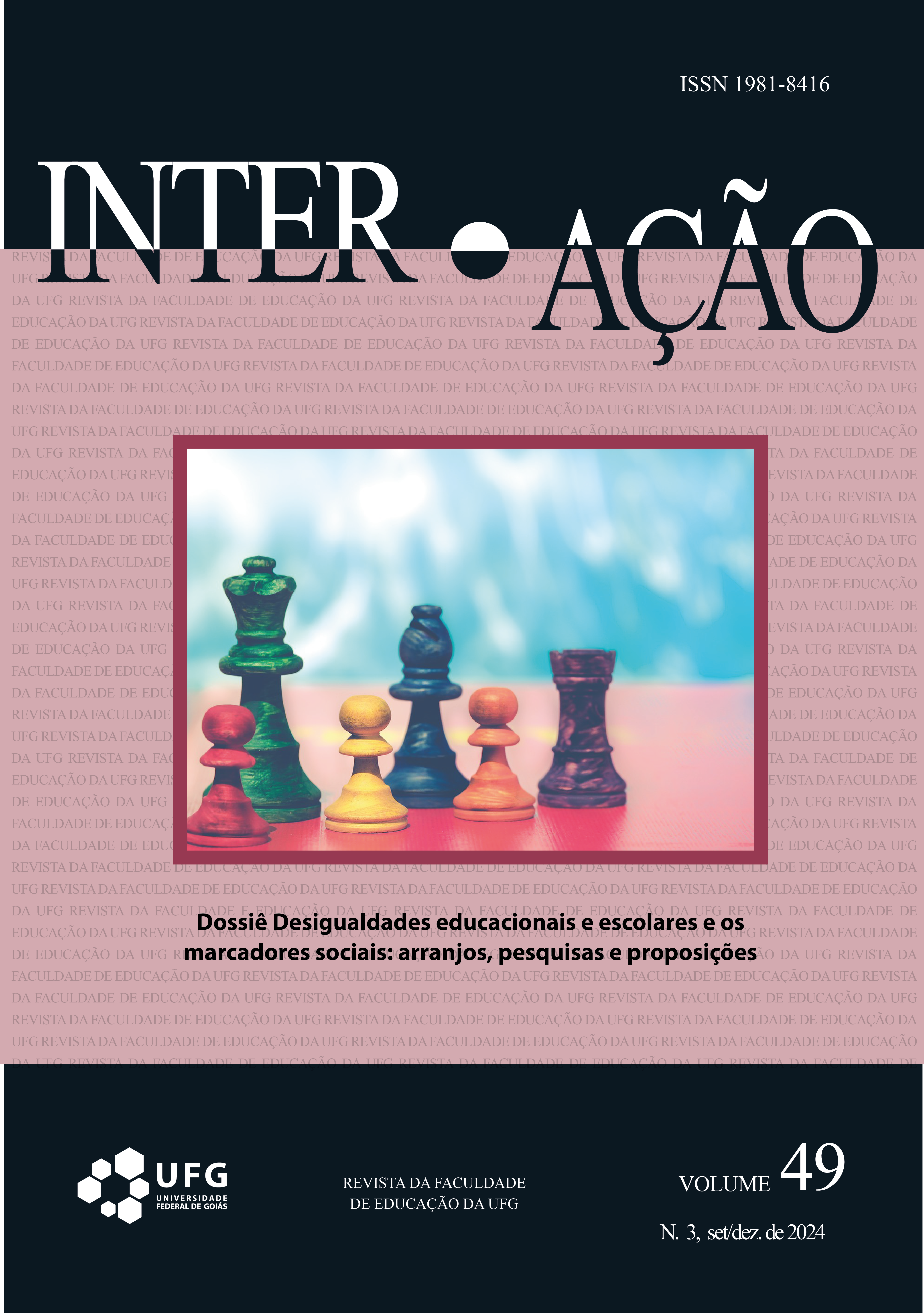The INCLUSION/EXCLUSION IN THE CLASSROOM: A STUDY ON THE PROCESSES OF PRODUCING INEQUALITIES
DOI:
https://doi.org/10.5216/ia.v49i3.80644Keywords:
Inclusion/Exclusion, Inequalities, Assessment, LearningAbstract
This work is the result of a qualitative bibliographic review aimed at understanding the concepts of inclusion and exclusion through teaching practices in the classroom that create inequalities. The procedure involved an analytical reading of publications on the subject, using the main theoretical framework from the works of Patto (2000, 2015), Freitas (2002), Faria (2008), and Saviani (2017). After conducting this study, the importance of discussing the need to break away from exclusionary practices in the school context was highlighted, in order to mitigate damage to students' learning, as well as to overcome the process of alienation and persist in the fight for a quality democratic public school.
Downloads
References
BRASIL. [Constituição (1988)].Constituição da República Federativa do Brasil de 1988. Brasília, DF: Presidência da República, 2016. Disponível em:https://www.planalto.gov.br/ccivil_03/constituicao/constituicao.html.Acesso em: 18 fev. 2024.
BRASIL. Lei nº 8.069, de 13 de julho de 1990. Dispõe sobre o Estatuto da Criança e do Adolescente e dá outras providências. Diário Oficial da União, Brasília, DF, 13jun. 1990. Disponível em: https://www.planalto.gov.br/ccivil_03/leis/l8069.htm. Acesso em: 8 dez. 2024.
BRASIL. Lei nº 9.394, de 20 de dezembro de 1996. Estabelece as Diretrizes e Bases da Educação Nacional. Brasília, DF, 20dez. 1996. Disponível em: https://www.planalto.gov.br/ccivil_03/leis/l9394.htm. Acesso em: 10 dez. 2024.
BRASIL. Lei nº 10. 172, de 9 de janeiro de 2001. Aprova o Plano Nacional de Educação e dá outras providências. Brasília, DF, 9jan. 2001. Disponível em:https://www.planalto.gov.br/ccivil_03/leis/leis_2001/l10172.htm. Acesso em: 10 dez. 2024.
FARIA, Gina Glaydes Guimarães de. Os ciclos do fracasso escolar: concepções e proposições. 2008. Tese (Doutorado em Educação) – Faculdade de Educação, Universidade Federal de Goiás, Goiânia, 2008.
FERREIRA, Aurélio Buarque de Holanda. Novo Dicionário da Língua Portuguesa. 4. ed. Rio de Janeiro: Nova Fronteira, 2001.
FREITAS, Luis Carlos. A internalização da exclusão. Educação e sociedade, Campinas, v.23, n. 80, p.301-327, set. 2002. Disponível em: http://www.cedes.unicamp.br. Acesso em: 10 dez. 2024.
IBGE. Instituto Brasileiro de Geografia e Estatística. Em 2022, analfabetismo cai, mas continua alto entre idosos, pretos e pardos e no Nordeste. Rio de Janeiro, IBGE, 2023.Disponível em:https://agenciadenoticias.ibge.gov.br/agencia-noticias/2012-
agencia-de-noticias/noticias/37089-em-2022-analfabetismo-cai-mas-continua-mais-alto-entre-idosos-pretos-e-pardos-e-no-nordeste.Acesso em: 16 fev. 2024.
PATTO, Maria Helena Souza. Mutações do cativeiro. In: PATTO, Maria Helena Souza. Mutações do cativeiro. 1 ed. São Paulo: Hacker Editores/EDUSP, 2000. p. 157-185.
PATTO, Maria Helena Souza. A produção do fracasso escolar: histórias de submissão e rebeldia. 4 ed. São Paulo: Intermeios, 2015.
SAVIANI, Dermeval. Democracia, educação e emancipação humana: desafios do atual momento brasileiro. Psicologia escolar e educacional, São Paulo, v.21, n.3, p.653-662, set./dez. 2017.
SEVERINO, Antônio Joaquim. Metodologia do trabalho científico. São Paulo: Cortez, 2007.
Published
How to Cite
Issue
Section
License
Copyright (c) 2024 Eriene Macedo de Moraes, Cinthia Brenda Siqueira Santiago, Gina Glaydes Guimarães de Faria

This work is licensed under a Creative Commons Attribution-NonCommercial 4.0 International License.
Inter-Ação uses the Creative Commons Attribution 4.0 License for Open Access Journals (Open Archives Initiative - OAI) as the basis for the transfer of rights. Open access means making documents available on the Internet free of charge, so that users can read, download, copy, distribute, print, search, or link to the full text of documents, process them for indexing, use them as input data for software programs, or use them for any other lawful purpose, without financial, legal, or technical barriers.
Authors publishing in this journal agree to the following conditions:
1) Authors retain copyright and grant the journal the right of first publication, with the work simultaneously licensed under the Creative Commons Attribution License, which permits redistribution of the work with attribution and first publication in this journal.
2) Authors are permitted to enter into additional, separate agreements for non-exclusive distribution of the version of the work published in this journal (e.g., for publication in an institutional repository or as a book chapter), with attribution and first publication in this journal.
3) Authors are permitted and encouraged to publish and distribute their work online (e.g. in institutional repositories or on their home page) at any time before or during the editorial process, as this may generate productive changes as well as increase the impact and citation of the published work.















